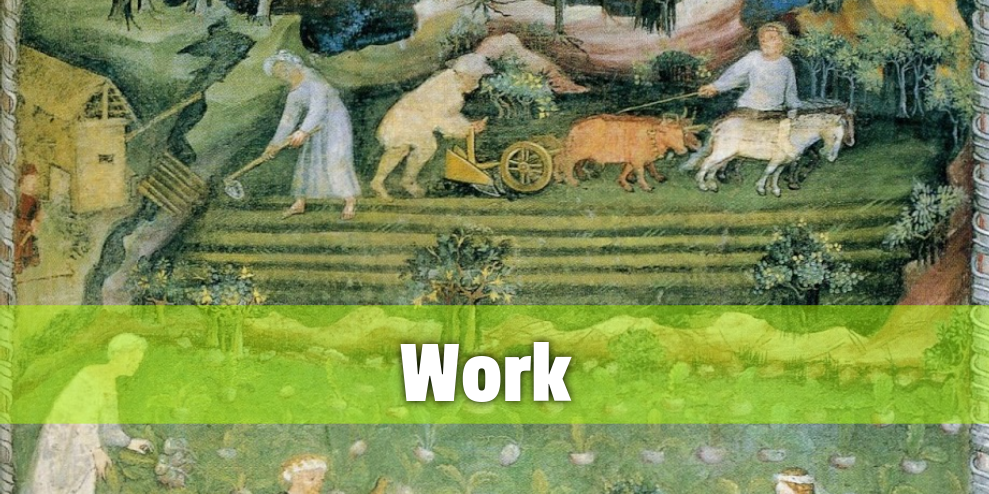Work

Conscious and deliberate activity of transformation of the environment by the species.
Work and the human species
Since the philosophers of antiquity, the social nature of our species had been discussed in essentialist and metaphysical terms. But in 1859 science took a giant leap forward with the publication of "The Origin of Species". The theory of evolution gives for the first time a material base to the famous "what are we and where do we come from" handled by all the idealisms and religions until today. For the young revolutionary workers' movement this advance was a particularly valuable scientific achievement that strengthened and promoted its own vision of the species and its future. It had nothing to do with the crude and unscientific "social Darwinism" later developed by the British bourgeoisie, which twisted the Darwinian metaphor to justify the concentration of capital and the pauperization of the great masses of workers.
The reading Engels makes then is materialist and dialectic. Materialist because the way of adaptation of the ancestors of our species, the transformation of the environment through the use of tools -that is, work- has no other origin or engine than the pure material needs of survival; and its consequences will be material too -the particular and characteristic development of the human brain. Dialectic because that development will take place in a complex relationship with the environment, manifesting itself as the interaction and mutual feeding between language, thought, the capacity of perception and the same capacity of transformation of Nature, work:
[Work] is the basic and fundamental condition of all human life. And it is so to a certain extent that we must say that work has created Man himself. (...) First work, then and with it the articulated word, were the two main stimuli under whose influence the brain of the monkey was gradually transformed into the human brain (...) And as the brain developed, so did its most immediate instruments: the sense organs. (...) The development of the brain and of the senses at its service, the growing clarity of consciousness, the ever increasing capacity for abstraction and discourse, reacted in turn on work and speech, stimulating their development more and more, and when Man separates himself definitively from the monkey, this development does not cease by any means (...) advancing as a whole in great steps, considerably driven and, at the same time, guided in a more precise sense by a new element that arises with the appearance of the finished Man: society.
Frederick Engels. "The role of work in the transformation from monkey to Man", 1876
That relationship, that social "metabolism" between species and nature, mediated by labor, had already been pointed out in "Capital".
Work is, first of all, a process between man and nature, a process in which man mediates, regulates and controls his metabolism with nature. Man is confronted with natural matter itself as a natural power. He sets in motion the natural forces that belong to his body, arms and legs, head and hands, in order to take over the materials of nature in a form that is useful for his own life. By operating through this movement on nature outside him and transforming it, he transforms his own nature at the same time. He develops the powers that were dormant in it and subjects the play of forces in it to his lordship.
Karl Marx. Capital, 1857
The historical and social forms and meanings of work
Our species, "in the social production of its existence" establishes social relations, "independent of its will", relations of production that correspond to a certain degree of development of its material productive forces. These relations, which "constitute the economic structure of society," signify and frame labor within the class structure of each mode of production.
This is why the social meaning of work has historically varied from one mode of production to another. Slave labor in slavery, servile labor (corvées) in feudalism, and wage labor in capitalism represent an evolution of the forms of exploitation and exaction of wealth created by the working class, parallel to the progress of the productive forces. In the next revolution, which is now possible for humanity, socialism, the transitional phase towards communism, work will be progressively freed not only from the exaction and compulsion it has had in all class societies, but from the very division between manual and intellectual work. With this, the border between free time and productive time and the alienation characteristic of all systems of exploitation will tend to disappear.
http://dictionary.marxismo.school/WorkThe overpowering subjection of individuals to the division of work will have disappeared, and with it also the opposition between intellectual and manual work, work will no longer be just a means of life, but will even have become the first vital necessity, (and) with the multifaceted development of individuals their productive capacities will have grown and all the sources of collective wealth will flow fully.
Karl Marx. Critique of the Gotha Program, 1875.